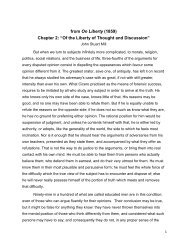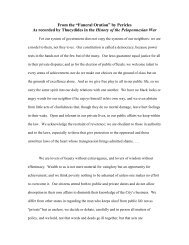Rousseau_contrat-social
You also want an ePaper? Increase the reach of your titles
YUMPU automatically turns print PDFs into web optimized ePapers that Google loves.
fight battles at the peril of their lives in defence of that which is<br />
the means of their preservation? All have indeed to fight when their<br />
country needs them; but then no one has ever to fight for himself. Do we<br />
not gain something by running, on behalf of what gives us our security,<br />
only some of the risks we should have to run for ourselves, as soon as<br />
we lost it?<br />
5. THE RIGHT OF LIFE AND DEATH<br />
THE question is often asked how individuals, having no right to dispose<br />
of their own lives, can transfer to the Sovereign a right which they do<br />
not possess. The difficulty of answering this question seems to me to<br />
lie in its being wrongly stated. Every man has a right to risk his own<br />
life in order to preserve it. Has it ever been said that a man who<br />
throws himself out of the window to escape from a fire is guilty of<br />
suicide? Has such a crime ever been laid to the charge of him who<br />
perishes in a storm because, when he went on board, he knew of the<br />
danger?<br />
The <strong>social</strong> treaty has for its end the preservation of the contracting<br />
parties. He who wills the end wills the means also, and the means must<br />
involve some risks, and even some losses. He who wishes to preserve his<br />
life at others’ expense should also, when it is necessary, be ready to<br />
give it up for their sake. Furthermore, the citizen is no longer the<br />
judge of the dangers to which the law-desires him to expose himself; and<br />
when the prince says to him: "It is expedient for the State that you<br />
should die," he ought to die, because it is only on that condition that<br />
he has been living in security up to the present, and because his life<br />
is no longer a mere bounty of nature, but a gift made conditionally by<br />
the State.<br />
The death-penalty inflicted upon criminals may be looked on in much the<br />
same light: it is in order that we may not fall victims to an assassin<br />
that we consent to die if we ourselves turn assassins. In this treaty,<br />
so far from disposing of our own lives, we think only of securing them,<br />
and it is not to be assumed that any of the parties then expects to get<br />
hanged.<br />
25











